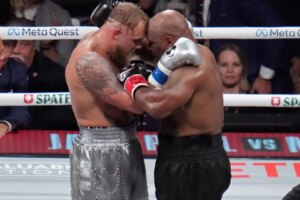Hailey Davidson, a 30-year-old transgender golfer, teed off at Stage II of LPGA Qualifying School this week, hoping to secure her spot on one of the world’s top women’s golf tours.
Davidson faces setback in LPGA Q School
However, a challenging six-over 78 in her first round left her in 171st place out of 195 competitors.
Only the top 35 players, along with ties, will move on to the final stage of qualifying in Venice, Florida, making Davidson’s chances of advancing slim.
Davidson’s attempt to earn an LPGA Tour card is set against a backdrop of growing debate over the tour’s transgender participation policy.
Since 2010, the LPGA has allowed transgender women to compete, provided they meet specific medical requirements, including gender-affirming surgery and maintaining hormone levels within certain limits.
Despite Davidson meeting these criteria, her participation in women’s golf continues to fuel controversy.
Debate over fairness in women’s golf
Earlier this year, more than 275 female golfers signed a letter addressed to the LPGA, USGA, and other governing bodies, urging them to reevaluate their inclusion policies.
The letter, sent by the Independent Women’s Forum, argued that allowing transgender women to compete alongside cisgender women could compromise the integrity of the sport.
It called for a clear and consistent policy based on a player’s biological sex, asserting that differences in physical attributes, such as muscle mass and bone density, create an unfair advantage in competition.
Davidson’s inclusion has sparked differing views within the golfing community.
Advocates for her right to compete argue that she has met the LPGA’s strict requirements for transgender athletes and point out that no transgender woman has yet risen to the top ranks of women’s golf.
Davidson herself addressed the concerns in a March Instagram post, dismissing the notion that transgender athletes are dominating women’s sports as a “laughable hypothetical.”
She emphasized the high level of skill required to compete in professional women’s golf and acknowledged that reaching the LPGA Tour remains a long-shot goal for her.
Opponents, however, cite concerns about fairness.
Some players feel that athletes like Davidson, who went through male puberty, may retain physical advantages that hormone treatments cannot fully negate.
The controversy surrounding Davidson coincides with a broader review of the LPGA’s playing policy.
In August, LPGA Commissioner Mollie Marcoux Samaan informed members that a comprehensive review was underway, with any updates to be announced before the 2025 season.
Samaan stressed that the tour’s top priority is ensuring fair competition, but also noted that inclusion remains an important value for the organization.
Read the full article here











